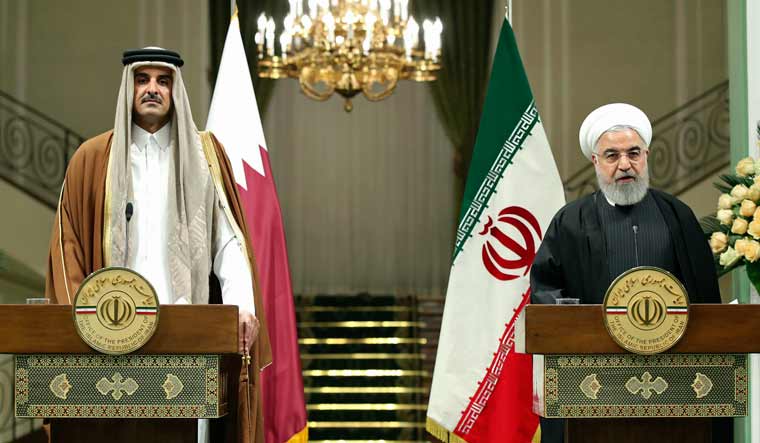Iran, after 10 days of heightened tensions with the US, during which both sides fired missiles and Tehran accidentally shot down a passenger aircraft, has signalled it favours a de-escalation.
The decision was made in a meeting between Iran's President Hassan Rouhani and the visiting Emir of Qatar Sheikh Tamim bin Hamad Al Thani.
"This visit comes at a critical time in the region, and we agreed with the brothers and with His Excellency the President that the only solution to these crises is de-escalation from everyone and dialogue," Rouhani said after the meeting.
Qatari Emir Sheikh Tamim was the first national leader to visit Iran after the killing of general Qasem Soleimani.
"Considering the importance of regional security — especially in the waterways in the Persian Gulf, the Strait of Hormuz and the Sea of Oman — we decided to have more talks and cooperation for the security of the whole region," Rouhani said as he stressed on the importance of stability in the region.
Iran's Supreme Leader Ayatollah Ali Khamenei said on Twitter, “The current situation in the region demands — more than ever before — strengthening of relations between countries in the region as well as avoiding the influence of foreigners."
Qatar has had strong ties with Iran but is also close to the US.
Qatari Foreign Minister Sheikh Mohammed bin Abdulrahman Al Thani met his Iranian counterpart, Mohammad Javad Zarif, in Tehran a day after Soleimani's killing and discussed the latest development and ways to maintain collective security of the region.
Tensions flared within Iran after a vigil for passengers who lost their lives in the air disaster turned into an angry protest. The temporary arrest of a British ambassador was also a cause for gripe among the protesters. US President Donald Trump in the meantime tweeted a warning to leaders of Iran. “Actually, I couldn’t care less if they negotiate. Will be totally up to them but, no nuclear weapons and “don’t kill your protesters,” he tweeted.
US Defense Secretary Mark Esper, however, said Trump was still willing to "sit down and discuss without precondition a new way forward" with Iran, although Tehran has steadfastly refused to hold talks with Washington unless it lifts sanctions first.
Tensions escalated between the two nations after a drone strike killed a top military commander, General Qasem Soleimani, who also was chief of the Quds Force. Iran retaliated by attacking the Al Asad airbase in Iraq that hosts the US and coalition troops with 15 missiles.
American media a day later had said that no one had been killed in the attack, while Iran's state-owned media said that there were 80 American casualties. Commander of Iran's Revolutionary Guards Hossein Salami in a briefing to the Parliament said that the missiles were not aimed at killing anyone.
Japanese PM Shinzo Abe, while meeting with Saudi Arabia's Crown Prince Mohammed bin Salman said military conflict with Iran will impact global peace and stability.
Abe, who is on a five-day visit to the Middle East will hold talks with leaders in Saudi Arabia, the United Arab Emirates (UAE) and Oman. Abe expressed concern for the safety of Japanese commercial ships operating there. He also called "on all relevant countries to engage in diplomatic efforts to defuse tensions"
On January 12, eight rockets slammed into an Iraqi airbase north of Baghdad where US forces have been based. Four local troops were wounded. American personnel had evacuated to Taji and Erbil following a rise in tension between Iran and the US after general Soleimani's death.
US Secretary of State Mike Pompeo tweeted: "Outraged by reports of another rocket attack on an Iraqi airbase. These continued violations of Iraq's sovereignty by groups not loyal to the Iraqi government must end."
On Saturday evening, a memorial at Tehran's Amir Kabir University in honour of those killed in the Ukranian plane that crashed in Iran turned into a demonstration that was attended by hundreds of students, who chanted “death to liars and demanded that those responsible should resign.
British Ambassador Rob Macaire who attended the vigil was arrested sparking a fresh diplomatic flareup. UK's foreign office said that Macaire's arrest was 'flagrant violation of international law.”


